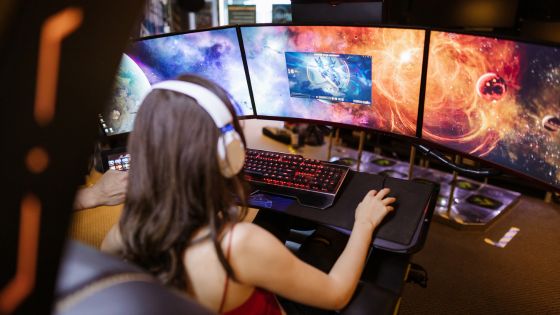Video games have gained in popularity among people of all ages, including teenagers, in today’s digital age. You must be concerned as a parent or guardian about how much time your 16-year-old should spend playing video games.


It is vital to create a balance between video game play and healthy living. Let’s take a look at how much time a 16-year-old should spend playing video games on a daily basis and how it affects their development.
Understanding The Importance Of Moderation
Understanding the significance of moderation when it comes to enabling a 16-year-old to play video games is critical. Setting reasonable boundaries for a 16-year-old’s video game play per day helps to maintain a healthy balance.
While video games can be an engaging and entertaining source of entertainment, excessive play can have a negative impact on the well-being of a 16-year-old. Establishing boundaries that favor other activities such as physical exercise, social contacts, and academic duties is critical.
Excessive screen usage can lead to sedentary behavior and physical health problems. It may also have an effect on mental health, generating feelings of isolation and separation from reality. When gaming takes precedence over studies, academic achievement can suffer.
Can Using A Vpn Help Me Control My 16-Year-Old’s Gaming Time?
A No-Lag VPN can improve your gaming experience, but it won’t help you control your 16-year-old’s gaming time. VPNs essentially protect and secure your internet connection by encrypting it and concealing your IP address.
VPNs can protect your child’s online presence when playing video games on a daily basis, regulating gaming time usually necessitates the use of other parental control features. These functions are available in a variety of software or applications intended expressly for regulating screen time and establishing gaming session restrictions.
You can provide a safer and more controlled gaming environment for your 16-year-old by combining the use of a VPN with effective parental control solutions.
Recommended Daily Time Limit For 16-Year-Olds
Setting a recommended daily time restriction for how long a 16-year-old should play video games per day is critical. While video games can be pleasurable and engaging, excessive play can be harmful.
It is typically recommended that a 16-year-old limit their video game play to no more than two hours every day. This guideline considers the need of maintaining a good balance between gaming and other activities such as studying, physical activity, socializing, and family time.
A 16-year-old can enjoy the benefits of video games while keeping a well-rounded and balanced lifestyle by following to this advised time restriction.
How Do The Secret Planets In Solar Smash Enhance The Overall Gaming Experience, And How Should A 16-Year-Old Manage Their Time Accordingly?
When it comes to the unlock all secret planets in Solar Smash, here are a few points that must be considered:
- Enhanced Exploration: The secret planets allow for further investigation within the game. They feature distinct landscapes, aesthetics, and gaming components that can enhance a 16-year-old player’s overall experience.
- Added Challenges: Unlocking and accessing secret worlds frequently needs certain activities or accomplishments. This adds new tasks and goals for the player to aim for, increasing the excitement and sense of accomplishment in their gaming sessions.
- Fresh Content: Secret planets add fresh stuff to the game, such as celestial bodies, landscapes, and even special features. This keeps the gameplay exciting and fresh, minimizing boredom and providing a diversity of experiences for a 16-year-old gamer.
- Extended Replayability: Solar Smash’s replayability is increased by including secret planets. A 16-year-old can continue to discover and unlock such hidden treasures, offering long-term engagement and reason to return to the game.
A 16-year-old must strike a balance when it comes to time management. They should set aside a certain amount of time each day for gaming, ensuring that it does not take precedence over other vital activities such as education, physical activity, social connections, and adequate rest.
Establishing a planned routine aids in the maintenance of a healthy balance and prevents excessive gaming, which can have a detrimental impact on other elements of their lives.
Negative Effects Of Excessive Video Game Playing
Excessive video game play can be harmful to a 16-year-old who plays video games every day. It is critical to realize the potential harmful implications of this activity.
Longer gaming time can lead to a sedentary lifestyle, which can contribute to health issues such as obesity and poor physical fitness. Furthermore, it can lead to social isolation, which limits real-world connections and impedes the development of critical social skills.
Excessive gaming can also impair academic achievement by interfering with focus, time management, and study habits. It is critical to advocate a balanced approach to video game play for a 16-year-old in order to ensure a well-rounded and healthy lifestyle.
Factors To Consider When Setting Time Limits
Several criteria must be considered when deciding the proper daily time limit for a 16-year-old to play video games. To begin, experts’ age-specific guidelines recommend limiting recreational screen usage, including video games, to no more than two hours per day.
Parental control is essential in determining the influence of gaming on academic performance, physical health, and social connections. A well-rounded lifestyle is achieved by balancing gaming with schooling, exercise, and socializing.
One’s personal maturity and self-discipline have a part in selecting the appropriate period. Parents can determine an optimal daily time limit for a 16-year-old to play video games by taking these things into account.
Is It Healthy To Play Video Games 12 Hours A Day?
Playing video games for 12 hours a day can have negative impacts on the well-being of a 16-year-old who engages in such extensive gameplay. For overall health, it is critical to strike a balance between gaming and other activities.
Excessive gaming for long periods of time can lead to a sedentary lifestyle, a lack of physical activity, poor posture, and probable weight gain.
It may also lead to less social connections, poor academic achievement, and a disregard for other key tasks.
Setting realistic limitations on video game usage is advised, as is encouraging a varied schedule that incorporates physical activity, socializing, and intellectual endeavors.
Conclusion
Finding the right amount of time a 16-year-old should spend playing video games every day involves careful analysis. While there is no one-size-fits-all solution, it is encouraged to achieve a balance by limiting screen time while making time for other pursuits such as education, physical activity, and social contacts. Moderation is essential for leading a balanced and healthy lifestyle.
















